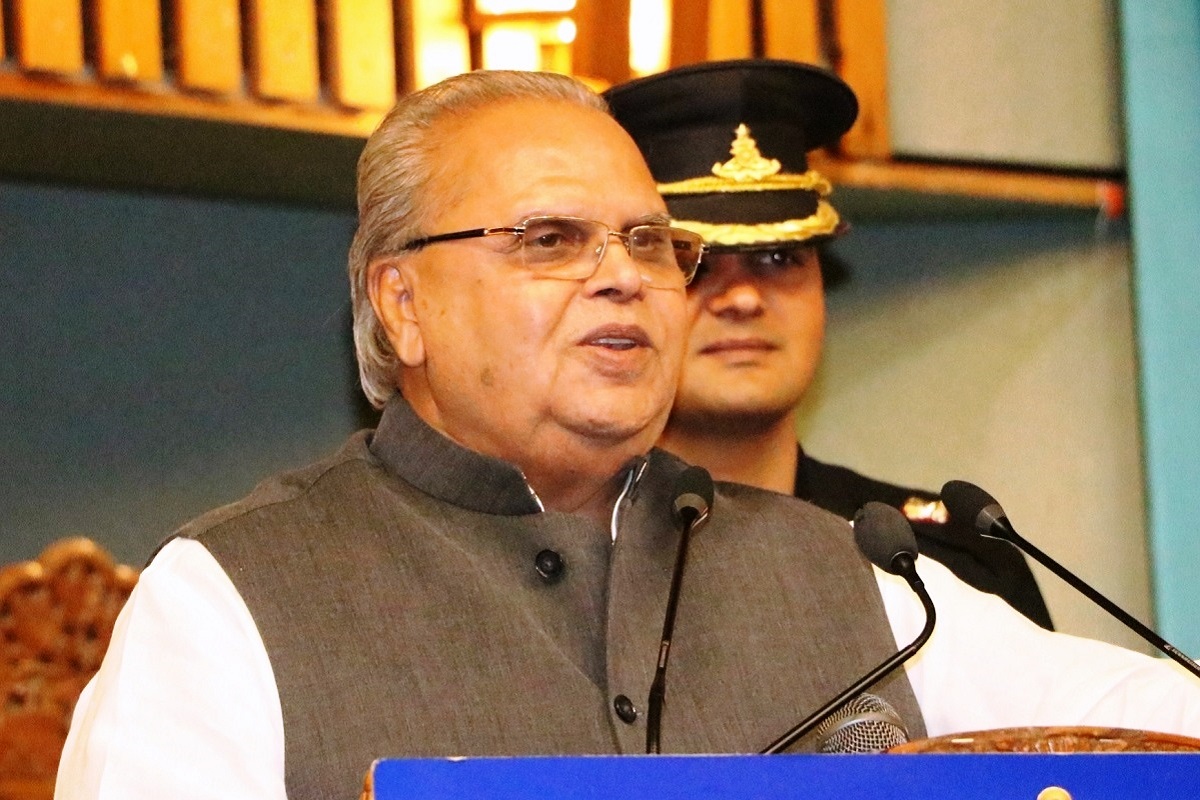Stage set for tomorrow’s polling in high profile Udhampur LS seat amid high security
Jammu and Kashmir has five Lok Sabha constituencies and each one will go to polls in separate phases because of security reasons.
The demand in Jammu was for repealing the Article 35A, whereas those in the valley claim it might lead to a demographic change of the Muslim majority state.

Jammu and Kashmir Governor Satya Pal Malik. (Photo: IANS)
Womenfolk in the Jammu region are anxiously waiting for Prime Minister Narendra Modi to fulfil his electoral commitment of repealing the controversial Article 35A that snatches the state’s permanent resident ship of those women who marry outside Jammu and Kashmir.
On the other hand, the decision of the centre to airlift 10,000 additional paramilitary personnel to Kashmir has created anxiety in the valley where rumours are circulating that the step was in view of the government contemplating “tinkering” with the Constitutional provision.
The Jammu region and the Kashmir valley are virtually split on the issue. The demand in Jammu was for repealing the Article 35A, whereas those in the valley claim it might lead to a demographic change of the Muslim majority state.
Advertisement
Not only the women, but continuation of the Article is being considered as cruelty also towards the Hindu refugees from West Pakistan who were living here as second-grade citizens for the past 72 years as they have been denied state subject rights by the successive Kashmir-centric governments.
Hope was rekindled among the affected segments of the society when in his campaign here for the 2014 Lok Sabha elections, Modi described the provision as inhumane and counted its demerits. A day later, Arun Jaitley, on the social media, provided with the legal aspects against the provision.
Article 35A was added to the Constitution through a situational Presidential Order on 14 May 1954. It empowers the state legislature to defile the classes of persons who are, or shall be, permanent residents of the State of Jammu and Kashmir; or confer on such permanent residents any special rights and privileges or imposing upon other persons any restrictions.
Reacting to the issue, Manu Khajuria Singh, a London based rights activist belonging to Jammu, said, “Thanks to Article 35A, I—a female permanent resident (PR) of Jammu and Kashmir— am not equal to a male permanent resident (PR).
“I am inferior as I have lesser rights. This arbitrary and illegal interpretation of law effectively — and within minutes of my marriage to a non-state subject — robbed me of my rights and my inheritance. India is a signatory of the United Nations General Assembly’s (UNGA) Convention on the Elimination of All Forms of Discrimination Against Women.
“Yet, India has allowed this gross discrimination against women to continue. This discrimination could be the character of Kashmiri leaders. How could this be the character of the entire nation?” she asked.
It has been alleged from time to time that the Kashmiri politicians draw sadistic pleasure by snatching the rights of women marrying outside the state and denying the right of higher education to the wards of West Pakistani refugees and Valmikis.
It is now four generations that these families were continuing to live like refugees.
Labh Ram Gandhi, president of the West Pakistani refugee action committee has been pursuing the matter with the centre and had met Modi twice to draw his attention towards the issue.
These refugees are empowered to vote only for the Lok Sabha elections and not for the state assembly, municipal and Panchayat elections because they have not been granted permanent resident status in J&K. Their children are not entitled to admission in colleges, universities or professional institutions in the state and have to go out in Punjab, Himachal Pradesh or any other nearby state for higher education. They are also not eligible for state government jobs.
These refugees had migrated in 1947 from Sialkot, Lahore and other areas that went to Pakistan during the partition. They have mostly settled in the three districts of Jammu, Samba and Kathua that are along the international border with Pakistan.
Their brethren, who settled elsewhere in the country, do not face any such problem.
According to the Ministry of Home Affairs, about 5,764 families — comprising 47,215 persons — migrated from West Pakistan in 1947 and settled here. Labha Ram said that in the last 72 years, the number of refugee families has gone up to 20,000 comprising about one lakh people.
In the early 1980s when these refugees intensified their agitation for basic rights, the then chief minister Sheikh Abdullah said that they were allowed to settle here as a “humanitarian” step and they cannot be granted permanent residency of the state.
They were also waiting for the implementation of the package that the central government had recently approved and announced a compensation of Rs 5.5 lakh to each family.
The Hurriyat Conference had organised protests in Kashmir when the government recently decided to issue identification cards to these refugees.
Advertisement